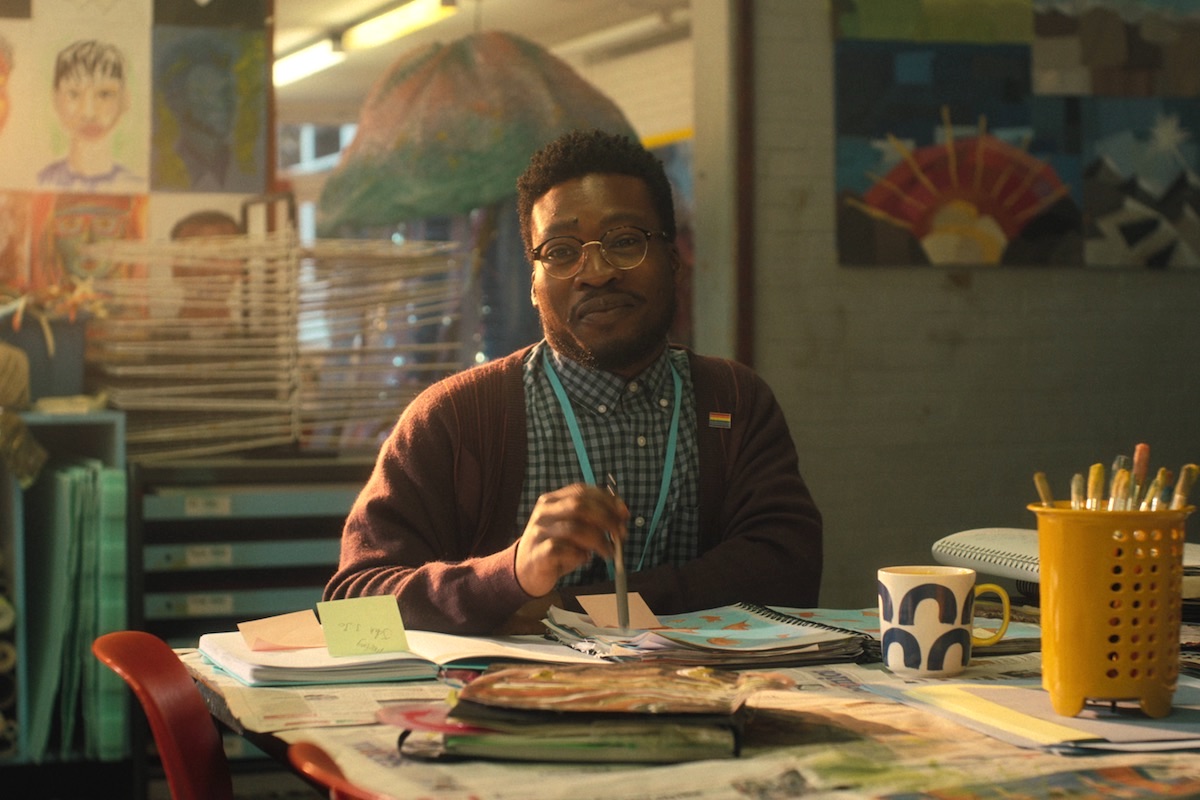I Can’t Stop Thinking About ‘Heartstopper’s’ Mr. Ajayi in the Context of ‘Don’t Say Gay’ and I Want To Scream

**No spoilers for Heartstopper ahead, just some discussion of basic plot.**
If Alice Oseman’s graphic novel-turned-Netflix series Heartstopper hasn’t already been your latest feel-good binge-watch, you’d do well to add it to the very top of your list.
Heartstopper focuses most of its story on Charlie (Joe Locke), an out, gay, British teen with a massive crush on his schoolmate Nick (Kit Connor). Charlie and Nick are heart-wrenchingly adorable to a degree that is likely to make you cry actual tears over how cute they are. (I did, anyway.) Part of what makes it such a beautiful story is that it focuses as much or more on the wholesome giddiness of teen crushes as it does the difficulties of being a gay teen.
But, as our Briana Lawrence wrote, “That’s not to say Heartstopper is 100% colorful leaves appearing on screen to express absolute joy. The series has its serious moments, but at the heart of it is a story that makes sure to treat its queer characters with care.”
Charlie deals with a lot, and his pain comes from both internal and external forces. He’s internalized the idea that life will be better for those around him if he makes himself as small and uncumbersome as possible—an idea repeatedly reinforced by school bullies. Fortunately, Charlie has a great support system, which includes his friends, his parents, and at least one teacher.
We learn early on in the season that the previous school year was very hard for Charlie, and that he was subjected to an enormous amount of bullying. He found solace eating lunch most days on the (beautifully painted) floor of the classroom of the art teacher Mr. Ajayi, played by Fisayo Akinade.
I love Heartstopper because it is beautiful, boundlessly sweet escapist TV. But because I also spend my days keeping up with and writing about legislative attacks on LGBTQ+ rights, it can be hard not to view things through the lens of our current reality. And when I view Mr. Ajayi through that lens, I want to scream.
What I love most about the character of Mr. Ajayi is that in most stories like this, he would be Charlie’s only source of support, his only confidant. As we’ve established, he’s far from the only supportive figure in Charlie’s life, but he is an important one. He is a gay adult who offers Charlie a safe space to be himself and to be at peace. He listens to Charlie talk about bullies as well as his romantic life, and he offers advice when asked for it.
In short, Florida Governor Ron DeSantis would be champing at the bit to see him fired and taken to court.
Watching this show, I kept finding myself thinking about how this kindness Mr. Ajayi offers to Charlie, a child in need, is what DeSantis and other Republicans nationwide want to ban from schools. And it makes me so furious I can’t stand it.
Defenders say the “Parental Rights in Education” bill is designed to protect young children from “grooming” and “indoctrination” into liberals’ gay/trans agenda or whatever. The actual text of the law reads, “Classroom instruction by school personnel or third parties on sexual orientation or gender identity may not occur in kindergarten through grade 3,” so its proponents are constantly claiming this only applies to young children.
However, the rest of that sentence reads, “or in a manner that is not age-appropriate or developmentally appropriate for students in accordance with state standards.”
That language—like much of the language around anti-“critical race theory” legislation—is deliberately vague. Who gets to decide what “age-appropriate” means? Not LGBTQ+ students or educators, that’s for sure. There have been reports of LGBTQIA teachers of all grades in Florida deciding to resign rather than be forced into the closet. NBC News describes one sixth-grade teacher being subjected to the ire of angry parents for simply acknowledging the fact that he is married to another man.
Another fourth-grade teacher said she chose to quit because “the law would erase me as an LGBTQ teacher … Nobody would be able to know, which then puts me in the closet, and I’m there seven hours a day, if not more, five days a week. I wouldn’t be able to be who I am.”
“And I don’t think I can bear to see the students struggle and want to ask me about these things and then have to deny them that knowledge,” she added. “That’s not who I am as a teacher.”
And that’s what I can’t help but think about when watching Charlie’s scenes with Mr. Ajayi in Heartstopper. If the series took place in Florida or a number of other states in the U.S. instead of in the U.K., we’d have to have a whole subplot about Ajayi struggling with whether he can give Charlie the most basic forms of emotional support and possibly facing professional consequences for that decision. Because he wouldn’t just let Charlie suffer in silence—that’s not who he is as a teacher.
This is a gay adult talking to a gay teen about his romantic life, even going so far as to offer extremely basic (and necessary) advice. That’s something that Ron DeSantis and his ilk simply cannot stand and it makes me furious.
(image: Netflix)
Have a tip we should know? [email protected]
